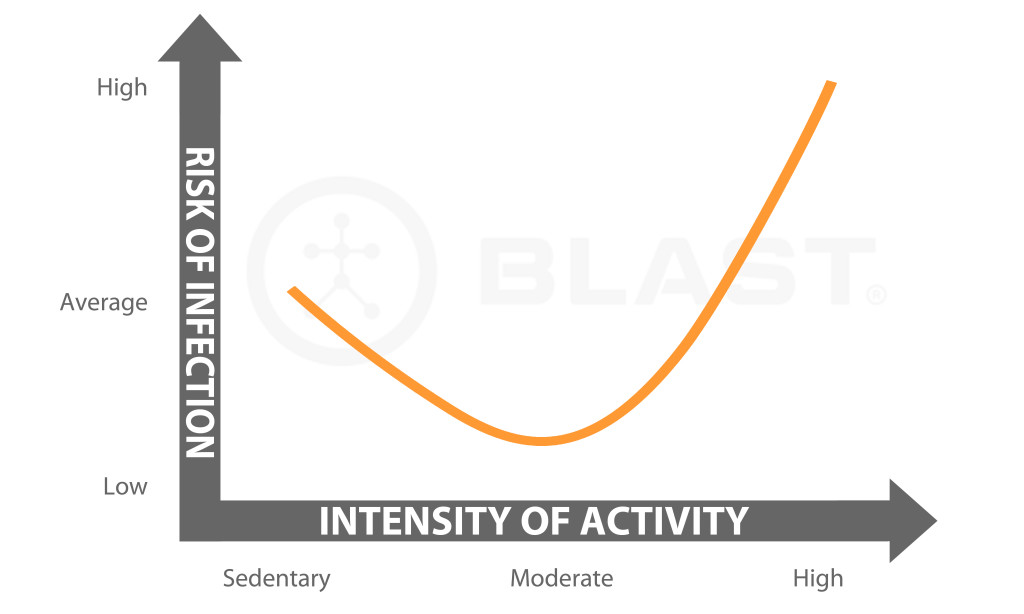It is understood that in order to achieve supreme health, you need a balance between daily exercise and a wholesome, nutritious diet. A combination of good diet and exercise reduces the risk for heart disease, diabetes, and depression, and improves energy – to name a few. But how much exercise does it take to truly influence your health?
Exercise does influence your immune system in a positive way, but it has been said that too much exercise weakens it. For a competitive athlete or fitness enthusiast, pushing yourself and perfecting your sport is innate, which is why it can be tricky to find the right balance. There are many variables when considering how the immune system responds to rigorous or moderate physical activity and stress. The purpose of this piece is to explore the immune system and develop a better understanding of how athletes can avoid illness (see a related e-book on avoiding injury) without compromising their performance goals.
What is the immune system and how does it work?
Everyone’s body is equipped with his or her own immune system. This system is made up of various organs, cells, and proteins that protect the body from harmful influences, such as viruses, pathogens (germs), and bacteria. Illness can occur when the body’s immune system is not performing at top levels. The main duties of the immune system include: recognizing, working against, and removing harmful germs, parasites, and viruses that have entered the body; and fighting against the body’s own cells that have altered due to an illness, such as cancerous cells.
How does physical activity influence the immune system?
Similar to how a combination of diet and exercise creates a healthy lifestyle; a balanced training program of exercise and rest leads to better athletic performance, thus supporting a healthy immune system.
According to research, epidemiological studies suggest that unusually heavy or chronic exercise is associated with an increased risk of upper respiratory tract infections (URTIs). In other words, when athletes push themselves too hard in training, it is not unusual to hear that they encounter frequent URTIs. This tends to occur in those that have just completed a marathon race. Usually one or two weeks after a marathon-type race, runners that engage in heavy exertion are more likely to be at risk of URTIs because of the negative changes in immune function and increase of their stress hormones. Within this same study, moderate amounts of physical activity can reduce one’s risk of URTIs due to the positive changes in immune function without the influence of stress hormones.
Researchers demonstrate the relationship between exercise and URTIs through a model entitled the “J” Curve, where a curve initially falls, but then rises to higher than the starting point. The model is broken up into three activity categories: sedentary, moderate, and vigorous. The curve is individualized based upon each person’s physical makeup, meaning that what may be vigorous for one individual could be moderate for another.
Stress
Stress is defined as a state of mental tension, something that causes feelings of anxiety or physical force. The impact that stress has on your body and brain can be related to how your body fights against harmful influences. Reoccurring stress can lead to a weakened immune system because the brain sends signals to the endocrine system, a collection of glands that produces hormones that regulate things such as metabolism, sleep, and mood among others.
There are three hormones that make up the stress system: Adrenaline, Cortisol, Norepinephrine.
- Adrenaline is known as the “flight or fight” hormone. It is produced by the adrenal glands and is known for notifying the brain immediately when a stressful situation occurs.
- Norepinephrine is similar to adrenaline, in that it is also released in the adrenal glands and its primary role is arousal. This hormone is responsible for getting your heart and blood pumping.
- Cortisol is a steroid hormone produced by the adrenal glands, known as the stress hormone. Although it takes more time, minutes versus seconds, for the brain to receive a surge of cortisol; when in survival mode, cortisol maintains fluid balance and blood pressure. Alternatively, when you tap into the stress hormone and are excreting too much cortisol, you can suppress the immune system.
According to experts, stress is responsible for as much as 90% of all illnesses and diseases, including cancer and heart disease. An example of good stress is when bursts of stress hormones are excreted to release the tensions of anxiety or to give the body a surge of energy. When chronic stress occurs in the body, high levels of stress hormones are circulated for longer periods of time than intended, thus weakening the immune system.
Athletes who are under a lot of pressure for their performance may encounter extreme cases of stress. This leads to anxiety, body tension (which can cause physical injuries), and a decrease in sleep quality, overtraining, and negative effects to their attention, memory, and decision-making.
Finding Balance
Sometimes mind over body is not the answer. When it comes to your health, you want to make sure you are conscious on how far you are pushing yourself. It is normal to want to be a better athlete or to accomplish that new PR (personal record). But the best way to achieve your goals is to stay healthy. This means listening to your body and recognizing early signs of stress. The following are some ways to balance your training schedule and keep your immunity strong:
- Develop a well-balanced training program. Make sure you are not solely focusing on one type of vigorous training. You want to thread other exercises and training such as meditation, yoga, and rest days throughout your schedule.
- Keep a training log. Similar to a journal that encompasses your thoughts and feelings, keep a log of how you felt during each workout. It is helpful to rate such events based on difficulty. If you noticed yourself becoming increasingly tired or feel pressure, incorporate an extra rest day or low intensity exercises into your training.
- Hone in on early warning signs. You can take the steps necessary (which may include consulting a doctor) to avoid weakening your immune system if you notice yourself feeling any of the following: insomnia or not having quality sleep, mood alterations or signs of depression, decrease of physical energy, extreme muscle soreness, frequent injury or illness, poor concentration, lack of appetite.
- Acknowledge other stresses and adjust your training accordingly. As an athlete, your sport is important, but there are other responsibilities to attend to. Some of which we can control, such as paying bills, going to school, working a job; others can be unexpected, such as a family illness. Either way, you want to take your other responsibilities and commitments into consideration. Make sure you are not over-scheduling yourself, and be kind to your body when the unexpected occurs.
- Be sure you are eating lean, mean, and green. You want to receive most, if not all, of your nutrients from fruits, proteins, and vegetables. Do not indulge excessively in refined sugar or alcohol. And consult a dietician for more detailed recommendations.



